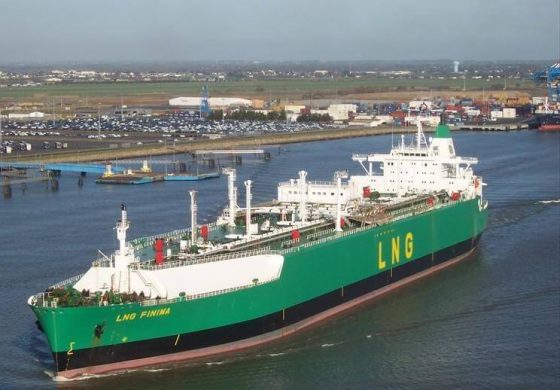News Update: Nigeria’s trade-off to amend NLNG Act seen too high

News Update: 60% forex allocation saved manufacturing sector – Report
August 21, 2017
News Update: Sanction against flouters of corporate governance not enough – NIM
August 21, 2017The Senate has been urged to consider the implications of the trade-off the country will make to amend the Nigeria LNG Act, which include foregoing $25billion investments in LNG Train 7 and 8, loss of investor confidence in Nigeria and reputational risk for the country, as it prepares to consider the Act.
A panel session at the 2017 Association of Energy Correspondents of Nigeria (NAEC) conference held in the Eko Hotel & Suites, in Lagos last Thursday, saw an impassioned discussion by representatives of the private sector, the government and civil society, over the implications of the amendment of the NLNG Act by the House of Representatives in May.
“The first issue in this amendment is the timing. The Nigeria National Petroleum Corporation (NNPC) is currently negotiating Train 7 of the NLNG with various parties and when this started going round in the media, it put the NNPC on the defensive,” said Dolapo Oni, head of energy research at EcoBank.
“A bigger picture is that Nigeria needs to monetise its gas and the NLNG has proven to be the best vehicle to do so. Trains 7 and 8 are meant to provide at least 18,000 jobs, so the question is, what is the trade-off we are getting from here if paying the three percent annual budget to NDDC means that these investments won’t happen? Would paying (3% of NLNG budget to NDDC) have created the same amount of jobs and investments?”
Nigeria’s LNG could not kick-off after it was first proposed in 1968 because of the huge capital investment required, which Nigeria did not have. Investors wanted assurances and guarantees that they will recoup their investments. In 1990 Nigeria granted the investors a ten year pioneer status, as well as generous concessions that prohibited further taxation and levies.
But Nigeria’s lower legislative house, led by Leo Ogor, PDP, minority leader from Delta state, has amended the Act, so that NLNG pays three percent of its budget to NDDC and free Nigeria from guarantees and assurances it gave to its partners.
Leo Ogor is facing investigation by the Economic and Financial Crimes Commission (EFCC) for allegedly awarding constituency projects to his companies; failing to declare these companies in his Asset Declaration Form and payment of over N318 million into two of his companies accounts by the NDDC for undisclosed projects.
Nigeria established the Niger Delta Development Commission (NDDC) in year 2000 to cater to development in the region. The law mandated all gas producing companies to pay three percent of their annual budget to assuage environmental degradation in the Niger Delta. The contention is that some oil companies who formed the NLNG (NNPC, Shell, Total and Eni) already pay this levy to the NDDC. Between 2002 and 2016, Shell alone paid $1.2 billion to the NDDC.
Furthermore, the NLNG does not produce gas but processes gas already produced by the oil companies, otherwise meant for flaring, into a liquid form for exports.
But Simon Yakubu Arabo, PDP, member of the gas committee in the House of Representatives from Kaduna State, insist that the “NLNG, with all its pretentions, is a gas producing company and the National Assembly has a duty to bring it in conformity to the constitution.”
“Those that have been saying we should not tamper with the NLNG Act, which basically is saying this law is here forever, we cannot allow that. There is nothing like a law in perpetuity, it does not happen anywhere in the world. You cannot have an act and say no one can touch it, we are a sovereign nation and we are duty-bound to review agreements that appear to short-change our common patrimony.”
However, through the NLNG, Nigeria’s patrimony has actually grown by $15 billion in dividends paid to the government. For the past six years, NLNG has paid over $5billion in taxes and employed 2,000 Nigerians directly and another 18,000 through vendors and contractors. NLNG contributes 4% to Nigeria’s GDP.
The NDDC has made significant strides in developing the Niger Delta, providing capacity development for close to 10,000 youths across the region, constructing over 5,000 km of roads and connecting hundreds of rural communities to the national grid. But many projects have also been abandoned by the admission of Nsima Ekere, its managing director.
Arabo further said “If we can amend the constitution of the country, what is so special about an act setting up an entity? They have had tax holidays for more than 16 years, what more are they looking for?”
However, Kudo Eresia-Eke general manager, external relations, NLNG, refuted this assertion, saying that the NLNG has been paying taxes for the past six years.
Tokunbo Mumuni, executive director, Socio-Economic Rights and Accountability Project, (SERAP) asked about the impact NDDC operations on the citizens.
“Previous contributions to the NDDC where are they and what has been the impact on the people? We should not just be concerned about companies paying levies, but judicious use of the funds collected from the companies is what is most prominent.”
Victor Eromosele, a former chief financial officer of NLNG said, “Rather than squabbling over this pie, why not bake a bigger pie? What signal does this decision by legislators send to investors? It simply says, Nigeria cannot keep its word. “We are talking about ease of doing business and this amendment is certainly against the spirit,” Eromosele said.

